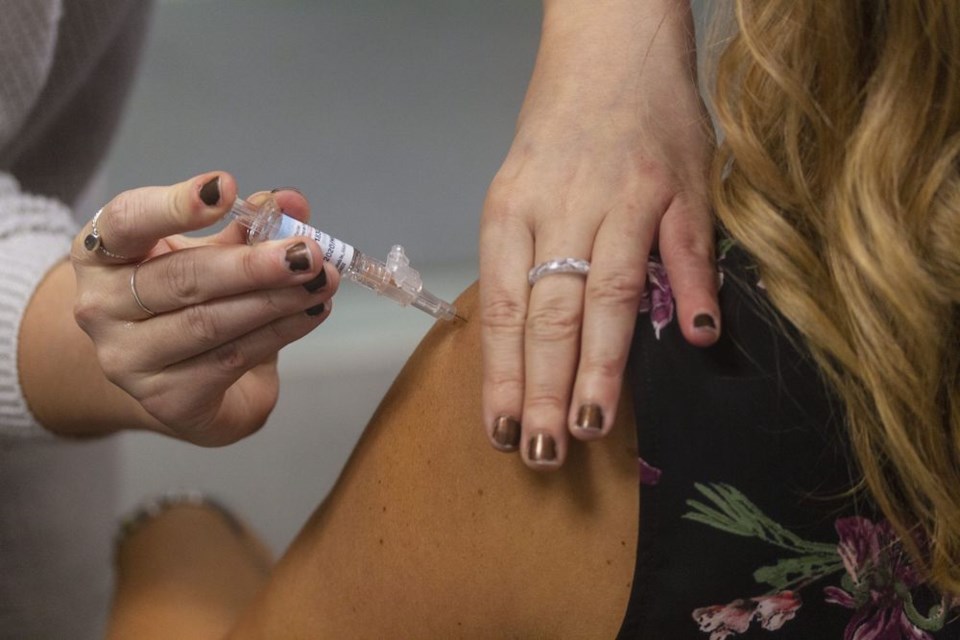COVID and flu shots will be available to the public starting Oct. 10, and medical masks will be required for all staff, visitors, contractors and volunteers in health-care settings starting Tuesday.
The measures were announced by provincial health officer Dr. Bonnie Henry and Health Minister Adrian Dix at a news conference in Â鶹´«Ă˝Ół»on Thursday.
Settings where masks will be required include all health authority-owned and operated health-care settings, hospitals, long-term care, assisted living, private hospitals, mental-health facilities and other patient-care settings.
“Yes, it is a requirement and, yes, I do expect that people will comply with that,” Henry said.
“It’s important, as we have more infections in the community, that we do what we need to do to protect those people who are most at risk of having severe illness and, frankly, dying from influenza, from COVID, from [respiratory syncytial virus].”
Long-term-care residents and health-care workers will receive their COVID and flu shots as soon as vaccines arrive in B.C., Henry and Dix said. Shots will then be available to the public through about 1,200 pharmacies as well as community clinics and primary-care clinics.
“We need and we want everyone, when they’re invited to do so, to get vaccinated,” Dix said. “It’s important for influenza. It’s important for COVID-19.”
Both Pfizer-BioNTech and Moderna have received Health Canada approval for their updated monovalent mRNA vaccine, which has been adapted to the Omicron subvariant XBB.1.5.
The new formulation is expected to be effective against circulating Omicron strains EG.5 and XBB.1.16 as well as BA.2.86. Henry said Thursday there has been just one reported case in B.C. of the latter strain.
Vaccinations will have a staggered start, with invitations to book appointments going out to priority groups starting in early October. (More details at the government’s website GetVaccinated.gov.bc.ca or phone 1-833-838-2323.)
Priority groups include people of any age in long-term care, those 65 and older, people with chronic health conditions such as cancer, HIV, hepatitis C and diabetes, Indigenous peoples, people who are pregnant, and health-care workers.
Public health officials recommend getting the COVID-19 vaccine at least six months from a previous COVID-19 vaccine dose or known infection.
Henry said while most people in B.C. have some immunity to COVID-19 through vaccination or infection, it’s waning. The newest COVID-19 and flu vaccines are tailored to the strains of viruses expected to circulate this season.
Those who have recently been infected with Omicron know it’s “not a pleasant infection” and still comes with the risk of severe illness and long-term symptoms for the most vulnerable, she said.
October is the optimal time for vaccination to offer protection through the winter months, when the risk is highest, Henry said. “We know that influenza, COVID, RSV, enteroviruses, adenoviruses, all of those things that cause respiratory illnesses tend to come back as we go into the fall and winter.”
British Columbians are being encouraged to get their COVID and flu shots at the same appointment. Most pharmacies will offer both.
In terms of influenza vaccines, there are a variety of injectables, said Henry. There is a nasal-spray vaccine for those age two to 17, as well as two enhanced vaccines for those over 65.
As for masks, ambassadors will be posted at most health-care facility entrances to ensure proper mask-wearing, Henry said. Dentist and doctors’ offices will be given recommendations and guidance around masking.
While visitors will be required to wear masks in long-term care residences, there will be opportunities for face-to-face visits with patients, Henry said.
Vaccination will continue to be mandatory for all new health-care workers, including nurses. Health-care workers who were not previously vaccinated will be considered fully vaccinated if they receive the newly updated COVID-19 shot.
Unvaccinated health-care workers will continue to be prohibited from working in hospitals and long-term care homes.
Dix said the province has been reviewing hospital bed counts to assess the capacity to handle flu season and other patient demands. He said he’s setting B.C.’s new bed base this fall at 9,880 beds, up from 9,202 beds.
Another 1,500 “surge beds” are being prepared by health authorities if extra capacity is needed, Dix said.
The province is set to hold its next update on the respiratory season on Oct. 5.
— with a file from The Canadian Press



